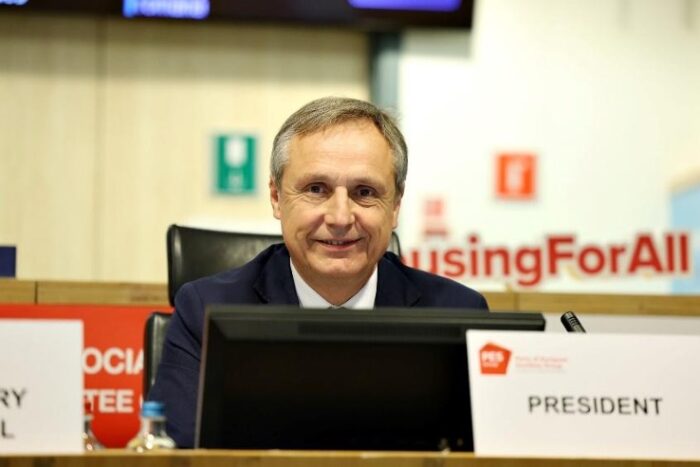Find all related Progressive Post
Progressive Post


Only a few weeks before the European Parliament elections, shortages of affordable housing have sparked protests in Lisbon, Amsterdam, Prague and Milan, but also in small and medium size cities, with the most vulnerable people raging against rents that are swallowing half of their incomes.
In the past, the European housing crisis affected only low-income workers, migrants, single-parent families and other vulnerable groups. Today, however, it has become a problem for everyone in the middle income. This crisis is certainly the main social issue of the 21st century, with far-right parties surfing on the discontent wave. They always prosper when they can exploit the social gaps that emerge out of underinvestment and inadequate government planning and, particularly, when they can blame migrants.
For this reason, as members of the PES Group of the European Committee of the Regions, we have declared housing our first priority for the European elections, and we propose a Marshall Plan for housing. Housing is not like any other commodity that can be bought and sold. It responds to a basic human need and constitutes a fundamental right, which must be enforceable and safeguarded for everybody.
Our Marshall Plan is twofold: obviously, we need to build more housing. But supply is not the only answer. We also have to come up with an innovative regulatory framework that simplifies the rules (to build new housing units), improves the funding and ends the market-only approach to housing. We should not be afraid to impose social conditionalities in this sector and actively fight against speculation.
With average rents in the EU almost 25 per cent higher at the end of 2023 than in 2010, the housing situation is no longer sustainable. Qualified workers and those delivering crucial public services (nurses, teachers, firemen and the police force for example) are no longer able to live where they are needed, as Enrico Letta highlights in his recent report Much more than a market. It demonstrates that, beyond the social crisis, decent, affordable, adequate and available housing is nothing less than a prerequisite to a competitive European Union.
The declaration of Portimão, adopted by our political family on 5 April 2024, puts forward a series of concrete proposals that aim to adapt EU policies, legislation and funds and have them contribute towards decent and affordable housing for all, while promoting climate goals and sustainable and inclusive communities at the same time.
EU member states, which have a long tradition of social protection and welfare states, are regrettably lagging behind international law when it comes to the recognition of housing as a legal human right. EU citizens, for instance, cannot appeal to their national courts when it comes to their right to housing. Making the right to housing an enforceable right must be our first priority, besides increasing EU competencies in the housing field. Housing should be considered a common good and a human right to prevent, first and foremost, homelessness as far as possible and to be able to tackle it rapidly whenever it does occur.
Money is always the problem in terms of investments, but we can free resources to renovate housing and build new units. First, members states should have quantitative national public investment targets to build more public, social and affordable housing with financial sanctions if their national goals are not reached. Secondly, 10 per cent of the unspent funds of the Recovery and Resilience Facility (RFF) and 10 per cent of the revenues of the new European tax on high financial assets (‘Tax the rich!’) should be used to build new housing units and renovate existing housing units. Thirdly, we propose to open the possibility that, during the next EU funding period post-2027, the European Regional Development Fund (ERDF) could be used, where and when deemed necessary by regional and local authorities, to build new social housing units in all European regions, and ensure that any housing project involving EU funds earmarks 30 per cent of funds for social and affordable housing for the middle- and low-income households.
Besides the investment strand, we need to review the EU rules and regulations about housing. Our key demand, in this regard, is to recognise social and affordable housing for all – and not only for disadvantaged people or socially less privileged groups – as a service of general economic interest (SGEI). Consequently, the next European Commission should amend the SGEI exemption decision so that member states, regions and cities can develop social housing programmes, not only for the most vulnerable, but also for everyone on middle income. Finally, we ask the European Commission to better fight against speculation, including through an EU-wide real estate transaction transparency registry and through a better implementation of the new regulation on short-term rentals.
All these measures are essential to tackle the current housing crisis, but they are not sufficient. We need to go a step further: intergenerational housing, gender equality and fair implementation of the European Green Deal in the housing sector, these are other fields in which we have to engage. Let us do so after the European elections, hand-in-hand with all European institutions and members states, during a regular annual EU summit on social and affordable housing, bringing all the stakeholders of the sector together so that nobody is left behind. Only this will we bar the extreme right’s way and bring long-term and fair solutions to all Europeans.
Photo Credits: Shutterstock/Redivory
| Cookie | Duration | Description |
|---|---|---|
| cookielawinfo-checkbox-advertisement | 1 year | Set by the GDPR Cookie Consent plugin, this cookie is used to record the user consent for the cookies in the "Advertisement" category . |
| cookielawinfo-checkbox-analytics | 11 months | This cookie is set by GDPR Cookie Consent plugin. The cookie is used to store the user consent for the cookies in the category "Analytics". |
| cookielawinfo-checkbox-functional | 11 months | The cookie is set by GDPR cookie consent to record the user consent for the cookies in the category "Functional". |
| cookielawinfo-checkbox-necessary | 11 months | This cookie is set by GDPR Cookie Consent plugin. The cookies is used to store the user consent for the cookies in the category "Necessary". |
| cookielawinfo-checkbox-others | 11 months | This cookie is set by GDPR Cookie Consent plugin. The cookie is used to store the user consent for the cookies in the category "Other. |
| cookielawinfo-checkbox-performance | 11 months | This cookie is set by GDPR Cookie Consent plugin. The cookie is used to store the user consent for the cookies in the category "Performance". |
| csrftoken | past | This cookie is associated with Django web development platform for python. Used to help protect the website against Cross-Site Request Forgery attacks |
| JSESSIONID | session | The JSESSIONID cookie is used by New Relic to store a session identifier so that New Relic can monitor session counts for an application. |
| viewed_cookie_policy | 11 months | The cookie is set by the GDPR Cookie Consent plugin and is used to store whether or not user has consented to the use of cookies. It does not store any personal data. |
| Cookie | Duration | Description |
|---|---|---|
| __cf_bm | 30 minutes | This cookie, set by Cloudflare, is used to support Cloudflare Bot Management. |
| S | 1 hour | Used by Yahoo to provide ads, content or analytics. |
| sp_landing | 1 day | The sp_landing is set by Spotify to implement audio content from Spotify on the website and also registers information on user interaction related to the audio content. |
| sp_t | 1 year | The sp_t cookie is set by Spotify to implement audio content from Spotify on the website and also registers information on user interaction related to the audio content. |
| Cookie | Duration | Description |
|---|---|---|
| CONSENT | 2 years | YouTube sets this cookie via embedded youtube-videos and registers anonymous statistical data. |
| iutk | session | This cookie is used by Issuu analytic system to gather information regarding visitor activity on Issuu products. |
| s_vi | 2 years | An Adobe Analytics cookie that uses a unique visitor ID time/date stamp to identify a unique vistor to the website. |
| Cookie | Duration | Description |
|---|---|---|
| NID | 6 months | NID cookie, set by Google, is used for advertising purposes; to limit the number of times the user sees an ad, to mute unwanted ads, and to measure the effectiveness of ads. |
| VISITOR_INFO1_LIVE | 5 months 27 days | A cookie set by YouTube to measure bandwidth that determines whether the user gets the new or old player interface. |
| YSC | session | YSC cookie is set by Youtube and is used to track the views of embedded videos on Youtube pages. |
| yt-remote-connected-devices | never | YouTube sets this cookie to store the video preferences of the user using embedded YouTube video. |
| yt-remote-device-id | never | YouTube sets this cookie to store the video preferences of the user using embedded YouTube video. |
| yt.innertube::nextId | never | This cookie, set by YouTube, registers a unique ID to store data on what videos from YouTube the user has seen. |
| yt.innertube::requests | never | This cookie, set by YouTube, registers a unique ID to store data on what videos from YouTube the user has seen. |
| Cookie | Duration | Description |
|---|---|---|
| COMPASS | 1 hour | No description |
| ed3e2e5e5460c5b72cba896c22a5ff98 | session | No description available. |
| loglevel | never | No description available. |


